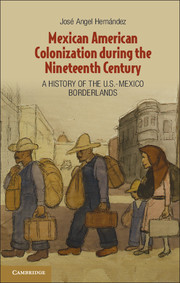 Mexican American Colonization during the Nineteenth Century
Mexican American Colonization during the Nineteenth Century Book contents
- Frontmatter
- Contents
- Figures
- Acknowledgments
- Introduction
- Part I Migration to Mexico in an Age of Global Immigrations
- Chapter One From Conquest to Colonization
- Chapter Two Postwar Expulsions and Early Repatriation Policy
- Part II México Perdido and the Making of Postwar Repatriation Programs Along the Borderlands
- Chapter Three Postwar Repatriation and Settling the Frontiers of New Mexico
- Chapter Four Repatriations Along the International Boundary
- Part III The Local Mixing, Unmixing, and Remixing of a Repatriate Colony in Chihuahua
- Chapter Five The 1871 Riot of La Mesilla, New Mexico
- Chapter Six Colonizing La Ascensión, Chihuahua
- Chapter Seven Anatomy of The 1892 Revolt of La Ascensión, or the Public Lynching of Rafael Ancheta
- Conclusion Repatriating Modernity?
- Bibliography
- Index
- References
Chapter Four - Repatriations Along the International Boundary
The Cases of Texas and California
Published online by Cambridge University Press: 05 June 2012
- Frontmatter
- Contents
- Figures
- Acknowledgments
- Introduction
- Part I Migration to Mexico in an Age of Global Immigrations
- Chapter One From Conquest to Colonization
- Chapter Two Postwar Expulsions and Early Repatriation Policy
- Part II México Perdido and the Making of Postwar Repatriation Programs Along the Borderlands
- Chapter Three Postwar Repatriation and Settling the Frontiers of New Mexico
- Chapter Four Repatriations Along the International Boundary
- Part III The Local Mixing, Unmixing, and Remixing of a Repatriate Colony in Chihuahua
- Chapter Five The 1871 Riot of La Mesilla, New Mexico
- Chapter Six Colonizing La Ascensión, Chihuahua
- Chapter Seven Anatomy of The 1892 Revolt of La Ascensión, or the Public Lynching of Rafael Ancheta
- Conclusion Repatriating Modernity?
- Bibliography
- Index
- References
Summary
INTRODUCTION
Approximately “25 percent of the total Mexican American population of the Southwest in the 1850s” was repatriated in the four decades following the end of hostilities, according to noted historian of the Mexican American experience Professor Richard Griswold del Castillo. Although accurate i gures would be almost impossible to determine because of the imprecision of statistical data then and now, studies have surfaced over the past few years that shed light on repatriation and return migrations. According to one author, for instance, the total number of Mexicans that “returned” to Mexico between 1848 and 1880 from the ceded territories amounted to 3,000. 3 Yet one Mexican commissioner sent to recruit Mexican families in New Mexico places the number much higher noting: “I have the satisfaction of being able to inform your Excellency that . . . at least eighty thousand persons are ready to emigrate to the territory [Chihuahua] of the republic.” Hence, the number of Mexicanos that migrated south in the decades after the Mexican American War continues to generate debate accompanied by a variety of conl icting numbers, but Griswold’s estimate of thirty-one thousand appears to be the most thoughtful of the lot.
- Type
- Chapter
- Information
- Mexican American Colonization during the Nineteenth CenturyA History of the U.S.-Mexico Borderlands, pp. 137 - 162Publisher: Cambridge University PressPrint publication year: 2012


